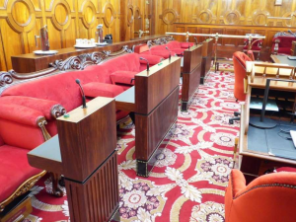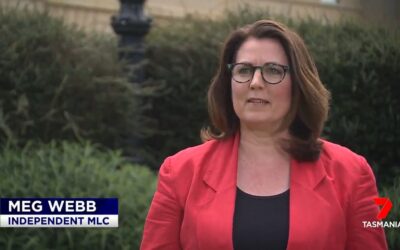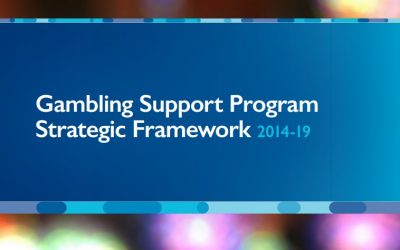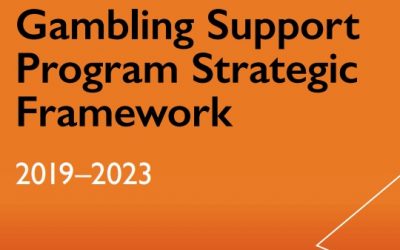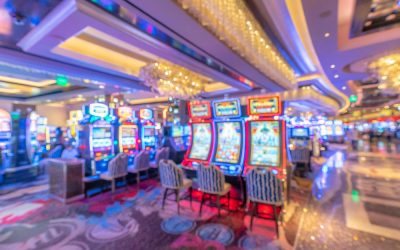A UNIVERSAL CARD-BASED SYSTEM FOR POKIES
Pokies Card Reform Champions Required: Implications of an early state election in 2024.
The introduction of the universal card-based system for poker machines (instigated by a Ministerial Direction rather than legislation) is currently being developed by the Tasmanian Liquor and Gaming Commission (TLGC) and scheduled for implementation by December 2024.
An early election before December, and a potentially different-looking parliament, could see the final implementation of the universal pokies card disrupted or even abandoned.
Hence, parties and candidates contesting the House of Assembly election need to provide a clear commitment to finalise and implement the planned introduction of the universal pokies card.
The specific campaign commitment sought from candidates can be read in the Tasmanian State Election Briefing paper: universal poker machine player card.
Read the Briefing Paper below and download here.
Background: universal pokies card
Following the passage of the Future Gaming Market Bill in November 2021, the Tasmanian Liquor and Gaming Commission (TLGC) was directed to report on both card-based play and facial recognition technology as potential harm minimisation measures for poker machines.
The TLGC’s Report recommended the adoption of a universal card-based system in Tasmania. The TLGC did not recommend implementation of facial recognition technology as it is not an effective tool for wider prevention of harm.
In September 2022, the State Government announced that a universal card-based system for poker machines would be implemented in Tasmania by December 2024. The card-based system will include pre-set daily, monthly and annual loss limits.
Further Information: Background Paper on a Tasmanian Universal Card-based System for Poker Machines (EGMs), February 2023.
LEARN MORE ABOUT POKIES IN TASMANIA
Impacts of pokies in Tasmania – who is affected?
At least 27,000 Tasmanians are addicted or in at-risk gambling groups. People in these at-risk groups account for between 40 and 60 per cent of losses to pokies. This industry takes the majority of its profits from people who are addicted and in at-risk groups.
What does the Social and Economic Impact Study of Gambling in Tasmania tell us?
The Social and Economic Impact Study of Gambling in Tasmania (SEIS) is the best source of information about local gambling activity. The SEIS provides useful data for making decisions about gambling regulation and consumer protection.
We can make pokies safer in Tasmania
In Tasmania, regular use of poker machines puts one in six users at risk of developing an addiction. But Tasmanian legislators can choose to regulate poker machines responsibly and effectively to provide much better consumer protection.
Australian pokies are especially harmful
Australia, with the exception of Western Australia, regulates poker machines significantly differently to most other countries.
POKIES ARCHIVE
Click the links below to explore my previous advocacy, submissions and legislative work related to poker machines.
1. Consumer protection and harm minimisation
The Government has made no plans for improving consumer protection. Why not? This is the easiest time to introduce stronger protections for consumers. The legislative process should at the very least introduce a $1 bet limit, as recommended by the Gaming Commission in the 2017 Parliamentary Committee. The $1 bet limit would be more effective if spin speeds were slowed to 6 seconds (also recommended by the Gaming Commission). You can find info about other consumer protections that would be effective in reducing harm here.
2. Length of licences
The Government proposes 20 year licenses for venues, casinos, keno and the monitoring system. Why 20 years? That is at least 5 elections away, during which time each Government will say they can’t make changes to the existing license. Some Australian states offer 10 year licenses. The Gaming Commission suggested 7 year licenses were sufficient. Let the Government know how long you think is reasonable for these licenses.
3. Economic returns for the state
The Government is not looking to get the best economic returns from the gaming industry. This is an industry that receives super profits – economic returns much higher than the value of the service provided. Why isn’t the Government planning to tax them appropriately? The casinos will only have to pay 3% into the Community Support Levy (CSL) whereas hotels have to pay 5%. Why not make them both 5%? Pokies in the casinos will only be taxed by the state at 13.91% (inc. CSL) while in pubs they will be taxed at 38.91% (inc. CSL). Why not tax all pokies at 38.91%? Table games and keno in the casinos will be taxed at less than 1%. Why so low?
4. Location and ownership
The licenses for pubs will be handed out to current venues. There will be no consultation with community, no regional or local government caps. Why not? Why would we not take this opportunity to reset the location of pokies in this state so we don’t keep concentrating them in the poorer suburbs? Owners of more than one venue will be able to move machines around within their venues across the state with no consultation with community (maximum of 30 machines in a hotel, 40 in a club). And the owner of the pokies monitoring system will be allowed to own pubs with pokies. The monitoring system sees all the data for every venue so it is no wonder that the current owner of the monitoring system owns 12 of the richest pubs in the state.
Background
The Gutwein Government has never made the case that its Future Gaming Markets (FGM) policy is the best possible option for our state, either financially or socially – it has never been examined and tested in the public domain. The Government has provided no credible rationale for the tax rates and licensing fees in the policy, and has not consulted outside the industry to inform those rates and fees.
A contribution to the debate
In an effort to contribute to public and parliamentary debate on the FGM policy, and with funding provided by Sir Max Bingham, I commissioned basic economic modelling to look at the potential state revenue that would be forgone by the government under its proposed policy.
What does the modelling tell us?
Leading independent economics, policy and strategy advisory firm ACIL Allen has reviewed the Government’s proposals for tax and license fees for pokies and keno in Tasmania. Their report finds the Government’s proposal is not the best deal for the State.
A small increase in license fees for pokies and setting tax rates in the casinos at the same rate as hotels for pokies and keno would see an additional $367 million going into the State budget over the proposed 20-year license period.
Instead of going to Tasmanian schools, hospitals and houses, that $367 million will go straight into the pockets of a small handful of poker machine businesses.
